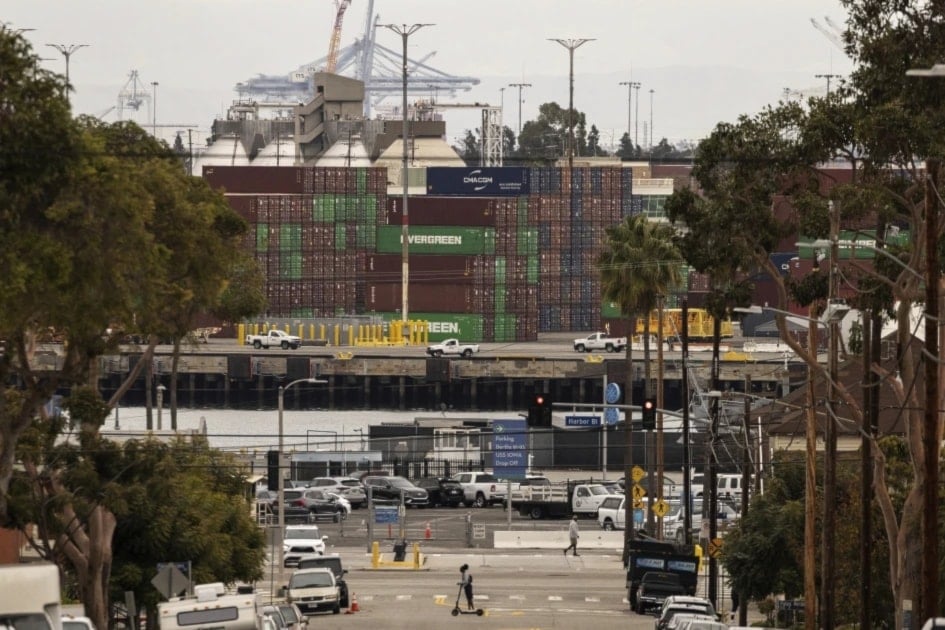Lost at sea: Why US shipping industry is in crisis - The Atlantic
In this Atlantic opinion piece, Arnav Rao argues that decades of deregulation and underinvestment have left the US dangerously dependent on foreign shipping, especially China.
-

A person on a scooter crosses a street in a residential area located right next to the Port of Los Angeles, Tuesday, March 11, 2025, in San Pedro, California (AP)
America’s decline in maritime capacity has become a critical vulnerability, argues Arnav Rao in an opinion essay for The Atlantic.
Once a dominant shipbuilding and sea power, the United States now builds just 0.13% of the world’s large vessels and owns virtually none of the commercial ships that carry its imports and military supplies.
With over 80% of its international trade by weight dependent on ocean shipping, this failure to maintain control of the seas is seen as a profound threat to national security.
According to The Atlantic, the current state of the US maritime sector is the result of decades of policy neglect. China now commands roughly 60% of all new shipbuilding orders and has more than 200 times the United States’ shipbuilding capacity. American ports rely on Chinese-made cranes, containers, and truck chassis.
As foreign firms dominate every link in the supply chain, the US Navy struggles with both a shortage of support ships and an insufficient number of American civilian mariners to crew them.
Pandemic exposed US vulnerability in ocean shipping
Rao notes that the early days of the COVID-19 pandemic made this vulnerability unmistakably clear.
Global shipping cartels, primarily European and Asian carriers, boosted spot rates by up to 1,000% and rejected US agricultural exports in favor of returning to China with empty containers to fill with higher-margin goods. This left American food rotting at the docks.
As The Atlantic details, the structural weakness in US maritime infrastructure extends to its military logistics. The Navy confirmed in late 2024 that it would lay up 17 support vessels, some newly delivered, due to a lack of qualified crews.
In the event of a Pacific conflict, the US would need over 100 fuel tankers but has reliable access to only about 15.
How deregulation gutted once-mighty shipping industry
At mid-century, the United States had a thriving, publicly supported ocean shipping industry.
But by abandoning regulatory oversight and public investment, Rao writes, the country undermined its long-term maritime strength.
The creation of the US Shipping Board and later the Federal Maritime Commission once enabled the government to restrain monopolistic pricing, prevent discrimination against small shippers, and keep cartels in check.
However, The Atlantic explains how policy shifts in the 1980s reversed course. The Reagan administration dismantled key aspects of maritime regulation under the belief that deregulation would promote efficiency. Instead, the reforms led to a resurgence of destructive competition, rate wars, and a wave of mergers.
The US Shipping Board had a whole fleet of laid-up vessels in the NY District in the early 1920s. We've added 580 folder level listings organized chronologically & by vessel name. Take a 👀 at https://t.co/Z8JaABBF00#FolderListFriday #ArchivesAtHome
— NationalArchivesNYC (@ArchivesNYC) May 29, 2020
📸https://t.co/L8SljYEdBR pic.twitter.com/caXCkd00II
Major American-flag carriers collapsed or were sold off, leaving no globally competitive US shipping line by the end of the 1990s.
Foreign cartels replaced national policy with profit-driven control
The consequence, Rao argues, has been a near-total foreign takeover of the US maritime domain. After Reagan-era deregulation, foreign-owned carriers and manufacturers began dominating not only shipping but also port infrastructure.
Asian nations, especially China, poured subsidies into shipbuilding, while the US slashed investment and let its shipyards fade into obsolescence.
As The Atlantic shows, today the US produces just a handful of large commercial vessels annually, nearly all for military use. Civilian surge capacity has vanished.
In a moment of growing geopolitical tension with China, this lack of maritime self-reliance represents a strategic liability of the highest order.
Regulatory solutions, not just tariffs, are urgently needed
Although some recent US efforts, including bipartisan congressional proposals and a White House executive order, aim to impose tariffs on Chinese-owned vessels and stimulate domestic shipyard investment, Rao warns that these measures don’t go far enough.
The real solution lies in reestablishing a system of regulated competition, one that prioritizes public service over corporate consolidation.
The Atlantic reports that such a system would compel shipping cartels to operate under strict government oversight, prevent excessive price hikes during crises, and ensure fair access for small and large shippers alike.
A revived Federal Maritime Commission could enforce uniform pricing standards and rein in exploitative practices.
Rao concludes that the United States has successfully tackled maritime collapse before, and it can do so again. During both World Wars, large-scale public investment and strong regulation transformed America into the world’s top shipbuilder. With coordinated policy, the same could happen now.
As The Atlantic emphasizes, it is not enough to rely on market incentives or reactionary tariffs. Only a bold, systemic approach, combining government-directed investment, robust regulation, and fair labor practices, can restore American command of the seas and protect national interests in an era of rising global instability.

 5 Min Read
5 Min Read








